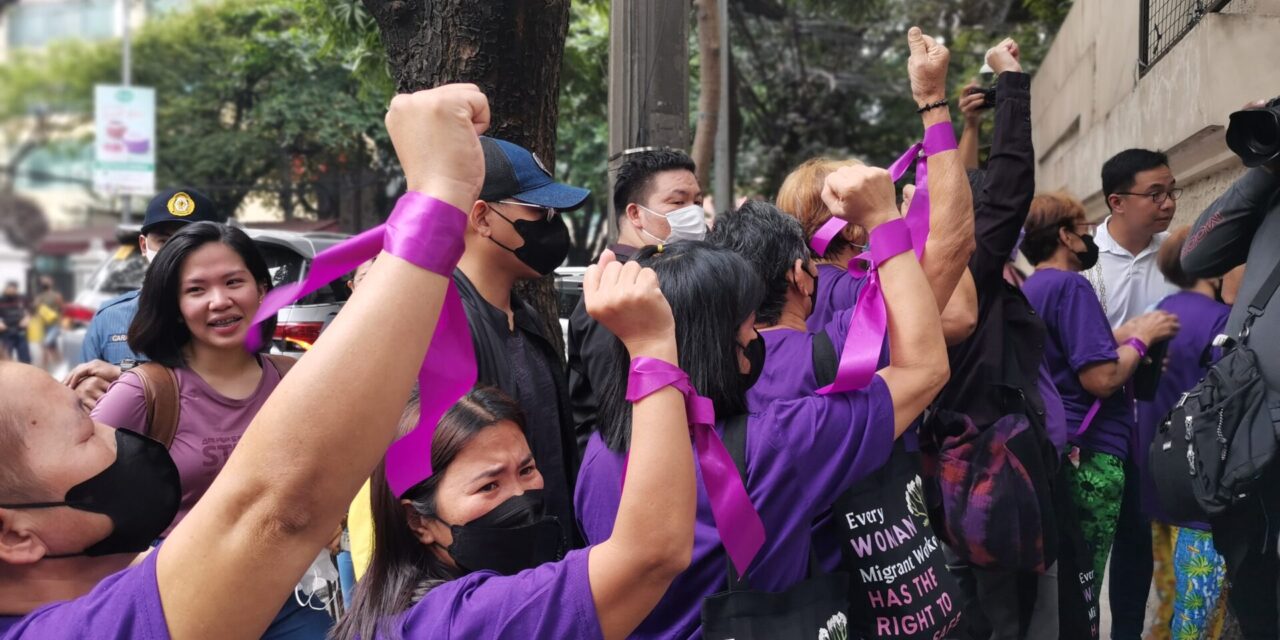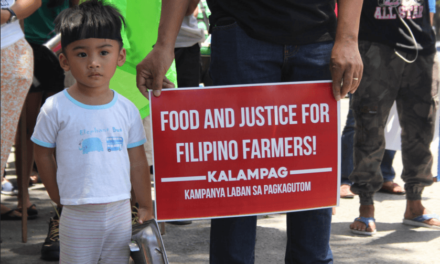With warrants of arrest already issued despite the lack of objective facts to determine probable cause, the eight women farmers—four of whom are senior citizens aged 72, 69, 68, and 61 years old—were left with no choice but to turn themselves in. This ironically happened on International Women’s Day, which was supposed to be a celebratory occasion honoring achievements toward gender equality and women’s contributions to nation-building.
On top of the syndicated estafa case, around 50 more cases have been filed against members of the Samahan ng Nagkakaisang Mamamayan ng Barangay Sumalo (SANAMABASU), the organization to which the eight women farmers belonged. These cases were mostly filed by the Riverforest Development Corporation (RDC) to undermine the farmers’ land rights claims. The RDC is claiming ownership of over 214 hectares of land in Sumalo.
The Kilusan para sa Repormang Agraryo at Katarungang Panlipunan (KATARUNGAN)—a peasant movement advocating for agrarian reform, rural development, and social justice—has also documented a number of similar cases of farmers, particularly from Central Luzon and Southern Tagalog regions, being filed with trumped-up charges by private companies and landowners seeking to take full control of their land. KATARUNGAN sees this as an alarming phenomenon that must be proactively acted upon by the Department of Justice (DOJ), the Department of Agrarian Reform (DAR), other concerned agencies, and even the legislature. KATARUNGAN further asserts that the cases aim to silence farmers, drain them psychologically, and weaken their resolve in claiming their land rights.
Meanwhile, the In Defense of Human Rights and Dignity Movement (iDEFEND) considers these cases as strategic lawsuits against public participation or SLAPP—damaging charges that incite fear among its victims, restrain free speech on issues of public interest, and drain resources by forcing victims to spend time and money on baseless lawsuits.
SANAMABASU and its legal counsel asserted that the syndicated estafa case should have been dismissed on grounds that:
- Those who filed the complaint are not bona fide members of SANAMABASU and are openly supporting RDC.
- The complainants failed to provide evidence on the alleged amount collected by the farmers.
- While nine farmers did collect membership contributions, the meager amount collected are used not for personal gain but for the organization’s initiatives to push the DAR and other concerned agencies to fulfill their mandate of implementing agrarian reform and protecting farmers’ rights.
- Accused farmers did not misrepresent DAR and did not promise that once members pay contributions, they will automatically qualify as an agrarian reform beneficiary.
- A mere affidavit and identification cards were only presented to the prosecutor.
Despite the complainants being unable to present sufficient documentary evidence to prove their claims, the Provincial Prosecutor of Bataan certified that there is probable cause. Surprisingly, the Regional Trial Court Branch 5 of Bataan also decided to issue an arrest warrant against the nine farmers.
Given the country’s snail-paced justice system and the inability of courts to handle agrarian cases differently compared to regular cases, the farmers fear that they will languish in jail. This is especially worrisome considering that the senior citizens who have been charged are already facing various health problems.
Despite all the odds, the women farmers did not go down without a fight to prove their innocence. For them, their act of surrendering did not represent the end of their struggle. Rather, it is their way of shedding light on the inequity of the justice system—where poor farmers who are charged with baseless lawsuits for fighting for their rights are immediately arrested, while rich and influential politicians and businessmen that have been proven guilty of plundering public coffers and profiteering from different crises are allowed to walk free.
Recognizing the courage and strength of the women who tirelessly fight for social justice, Judy Pasimio of LILAK (Purple Action for Indigenous Women’s Rights) said, “In celebrating Women’s Day, we celebrate the strength and persistence of rural and indigenous women to assert their rights to their land and ancestral domain…Despite [the different challenges they face], they stand their ground. And today, we salute them, as we call for the end of assault against women land rights defenders.”
The Sumalo women farmers also took the opportunity provided by the International Women’s Day to demand the government to put an end to the systematic criminalization of women land rights defenders.
Magdalena Sanchez, a 72-year-old woman farmer from Sumalo, mourned, “Many farmers who are deep in poverty are being criminalized and killed…If the government allows this to continue, we will have no more farmers,” she warned.
“The rich and powerful individuals who have been taking away our lands were not satisfied with all the harassment they have committed against us. Now, they also resorted to charging us with syndicated estafa,” decried Fe Andulan, 61 years old and one of the Sumalo women farmers. “We call on the DOJ to investigate these cases,” she added.
Rural women from other communities who have also faced criminalization joined the calls of the Sumalo women farmers.
Ronnie Banquiles, a coconut farmer from San Narciso, Quezon Province stated, “My wife has experienced grave mental health conditions because of the cases filed against us. We hope that this will stop.”
Glenda Lape, a woman farmer from San Andres, Quezon also faced the same fate and added, “This should not be done to us farmers. We just want to make a living.” Glenda and her husband were arrested on Christmas Day of 2022, also falsely charged by landowners for qualified theft.
The growing trend of criminalization of farmers fighting for their right to land further undermines women’s access to land and the resources tied to it. Jean Enriquez, National Coordinator of World March of Women-Philippines (WMW-Pilipinas) and the Coalition Against Trafficking in Women – Asia Pacific (CATW-AP) stated that the denial of land rights as women’s rights has rendered women vulnerable to trafficking and prostitution. “We have been assisting young women victimized in so-called high class prostitution following the incarceration of parents who are farmers defending their land.”
“We fear that the criminalization of eight mothers and a male farmer in Sumalo as well as more rural women across the country will render more daughters vulnerable to sexual exploitation,” added Enriquez.
Given women’s crucial role in food production, their criminalization and the violation of their right to land—which is necessary for them to be able to produce food—also undermines the nation’s food security.
“Rural women experience the heaviest impacts of the decades of systemic neglect of agriculture and fisheries. They take responsibility for the multiple burdens of domestic and productive work, but this is not recognized or valued. Rural women are also not provided with spaces to participate in decision-making bodies,” decries Janel Geconcillo, president of the Pambansang Koalisyon ng Kababaihan sa Kanayunan (PKKK).
If the Marcos administration were thus serious about its commitment to addressing the food crisis, it should put an end to the systematic harassment and abuse of women farmers who work to bring food to our tables and ensure the protection of their right to land.
The said criminalization is also a manifestation of gender injustice and an outright infringement on the rights of women to livelihood and their other fundamental liberties.
In the recently concluded meeting of the United Nations Human Rights Council in Geneva, Switzerland, it is important to note that Justice Secretary Jesus Remulla stated that, “reforms include raising the quantum of proof for filing of criminal cases in court to “probable cause with reasonable certainty of convictions” and “a closer coordination and cooperation between prosecutors and law enforcement agencies in gathering evidence and preparing witnesses to ensure only quality cases will be filed in court.”
The case of Sumalo women is ultimately a test of his sincerity to this pronouncement.
The organizations that rallied together with the women farmers include iDEFEND, Katarungan, Focus on the Global South, World March of Women-Pilipinas, Sentro ng mga Nagkakaisa at Progresibong Manggagawa (SENTRO), Pambansang Koalisyon ng Kababaihan sa Kanayunan (PKKK), LILAK – Purple Action for Indigenous Women’s Rights, Women’s Legal and Human Rights Bureau (WLB), Coalition Against Trafficking in Women – Asia Pacific (CATW-AP), Center for Media Alternatives (CMA), WomanHealth Philippines, and the Foundation for Media Alternatives (FMA).












![Upcoming Event: Honoring the Legacy of Sombath Somphone [2 December 2022]](https://focusweb.org/wp-content/uploads/2022/11/Sombath_Speakers-Poster-440x264.png)






